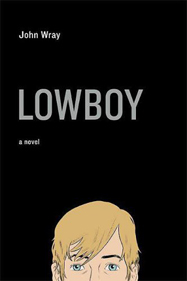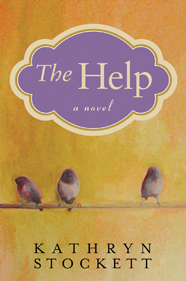-
March 10, 2010
Opening Round
-
Commentary by
Kevin Guilfoile & John Warner
-
Today’s Winner:
2The Help
Kevin: I have spoken to dozens of book clubs—probably an average of one a month for the last five years—and at the end of the evening I always ask the ladies (the real first rule of book club is there are no men in book club) what else they have been reading, and especially what they liked. In all that time, I have never seen the kind of unanimous, getting-the-vapors-just-talking-about-it enthusiasm for a novel that I have seen for The Help. Not for The Kite Runner. Not for The Curious Incident of the Dog in the Nighttime. If Jodi Picoult herself walked into a book club and offered to donate her marrow to save a dying child during a discussion of The Help, she would be told to pour herself some Barefoot Chardonnay and shut the fuck up. When I told a neighbor of mine that I was going to read The Help, she dashed into her house and returned with a copy that, despite being just a few months old, was more tattered and abused than Michael Chabon’s collection of 1970s Marvel comics.
But I opened it with a lot of trepidation. I was a part-time domestic servant for three years. Throughout summers and breaks from college, I worked in the home of a wealthy man alongside a cook, a butler, a maid, a laundress, and two full-time groundskeepers. There was no racial component to our service, (although the title that appeared on my W-2—Houseboy—was certainly a carryover from plantation days), but most people who write about domestics get it wrong, based on my experience. And from what I’d heard about this book, I feared it was going to be all gooed-up with condescension.
So I was genuinely surprised at how much I liked The Help. Stockett can write, and it’s an engaging story, cleverly told. And although I might complain that the particular racial issues it raises have been, by now, mostly asked and answered, the South depicted in this novel is not that far in the past—almost in my own lifetime. I can’t deny that there are white people currently living in the South who will recognize themselves in these pages and will be made uncomfortable.
John: I believe that I was the one who suggested The Help as a possibility for this year’s tourney based on the extreme enthusiasm exhibited by my wife for the book, which was then followed by the chorusing hosannas of my mother, her mother, her sister, her book club, her ophthalmologist, and the Jehovah’s Witnesses who came to our door just trying to drop off some copies of The Watchtower, and left instead with a copy of The Help.
I was resistant to her entreaties to read The Help for quite a while, fearing it for reasons similar to yours, minus the history of domestic service (I did work for the Post Office, though), but when I read it, I was pleasantly surprised, which is far more of a commentary on my attitudes than the book itself which is a highly competent and compelling piece of fiction.
One of The Help’s virtues is that the rotating perspectives allow Stockett to create a number of narrative cliffs over which she likes to dangle the reader. Chapters invariably end on the cusp of…something, and she gives you plenty for reasons to find out what. I guess we used to call that plot. Maybe we still do, but you don’t often hear people discussing the great plots of literary prizewinning books.
In the end, though, The Help left me feeling unsettled. While, as you note, the history is relatively recent, I couldn’t help but wonder if vast swaths of the book aren’t just, for lack of a better word, wrong. Aibleen speaks in a black dialect that may or may not be authentic (I have no idea), but still has a touch of the minstrel to it. Beatings and killings of blacks at the hands of white supremacists happen in the world of the novel, but never on its actual pages, leaving the story feeling a bit sanitized.
To be fair, though, that leaves room for Stockett to write about what she’s interested in, which is the relationship between Skeeter and Aibleen and the legacy of white children being raised by black domestics.
Kevin: You and I were discussing The Help shortly after we both read it, and you said something about how you almost couldn’t design a novel in a laboratory that seemed more destined to be a book club bestseller than this one. The white people in The Help are, with only a couple exceptions, so one-dimensionally horrible that if you are a white person with anywhere from a center-right to liberal orientation, reading The Help will make you feel very, very good about yourself. If you are even moderately racist, in fact, The Help will probably make you feel good about the relative amount of racism you possess. Take the following one question quiz—If a black person were in your house, where would you send her if she asked to use your restroom? If your answer is not “the driveway,” The Help will make you feel good about yourself. The same thing can be said about To Kill a Mockingbird, of course, and I don’t believe Stockett wrote it with anything like cynicism—it’s a very earnest book that I think successfully captures the angst Stockett feels as a white person who was largely raised by black nannies, often to the detriment of her caretakers’ own children—but you can certainly feel yourself being manipulated a bit as you read, which I suspect led to some of your discomfort. It’s not a substitute for reading Native Son, but it’s not supposed to be.
There’s much more to say about the dialect issue, but let’s save that for the next round, especially since it’s a subject that bleeds over into a couple other books in the tourney.
John: It feels like we should talk about Lowboy some since it’s exiting the Tournament, unless it’s resurrected for the Zombie Round. I know even less about the interior of a teenager in the midst of a schizophrenic break than I do about southern black dialect—the only thing I know even less about is calculus—but I found Lowboy himself to be a compelling companion. His mother, less so, in my opinion. Whereas The Help has a plot that hinges on events linked in a causal chain, I felt like a fairly significant chunk of the narrative drive in Lowboy relies on a revelation that I think we see coming far too early. A very solid read, and I rated it higher than The Help on my personal favorite list, but hindsight leaves me unshocked by Stockett’s victory.
You’ve got to give John Wray credit for originality in the art of promotion, though. He managed both a magic marker tattoo of New York Times book critic Michiko Kakutani and an interview conducted by Zach Galifianakis and his beard.
Kevin: John Wray was everywhere last week: NPR. The New York Times Magazine. Yay! Serious young writers are almost relevant.
Now if only he could get himself on The Marriage Ref.
With The Help advancing in our confidence pool, I pick up 12 points and you pick up 8, giving me an early and very tenuous 28-24 lead.
Kevin Guilfoile is a contributing writer for TMN. His debut novel, Cast of Shadows, has been translated into more than 17 languages, and his second novel, The Thousand, will be published in August 2010 by Alfred A. Knopf.
John Warner is a contributing writer for TMN. He is the author of Fondling Your Muse: Infallible Advice From a Published Author to the Writerly Aspirant. He teaches at Clemson University.

















